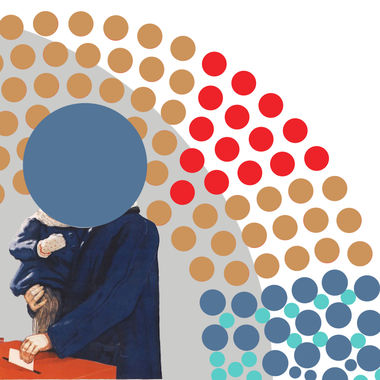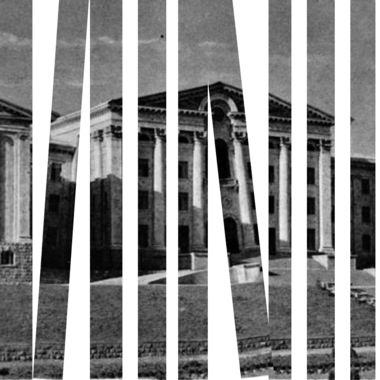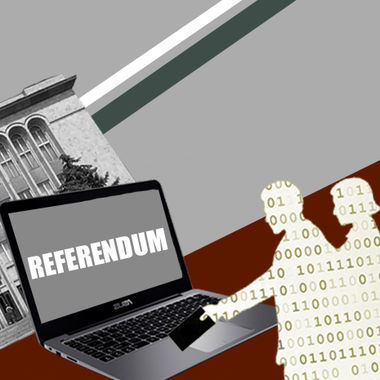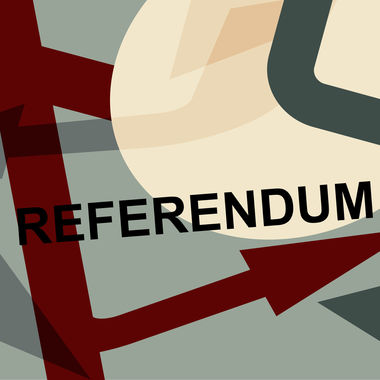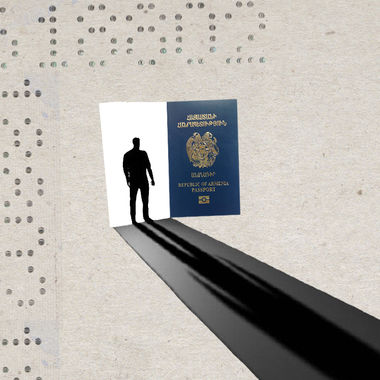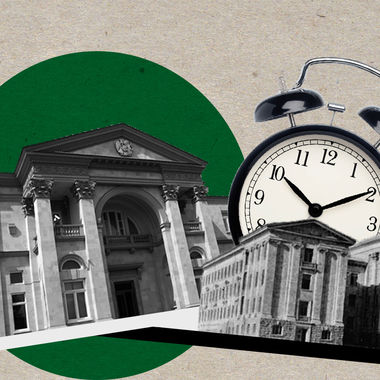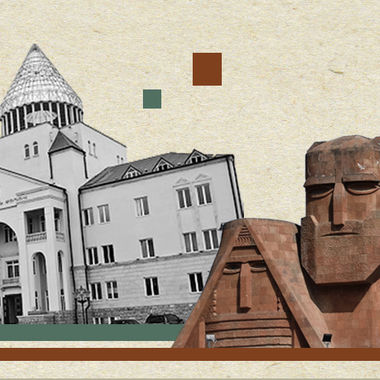Mon Mar 15 2021 · 10 min read
Electoral Reform Bill Made Public as Early Election Talks Continue

By Harout Manougian

Three in four Armenians are convinced that the country’s Electoral Code needs to be reformed, according to a recent poll conducted by the International Republican Institute (IRI). It is a relative consensus opinion, shared by both supporters and opponents of Prime Minister Nikol Pashinyan. Discussions of what that reform will look like began in the summer of 2018, immediately after the Velvet Revolution. Back then, it was seen as a necessary step before the calling of an early parliamentary election. However, the reform bill failed to attract sufficient support from Republican Party of Armenia MPs, who still dominated the legislature at that time. As a result, the early election that took place in December 2018 was held under the same rules as the parliamentary election of April 2017.
Now in 2021, the country once again is discussing the prospect of early elections (though official pronouncements on the issue alternate between hot and cold as often as the March weather forecast). Edmon Marukyan, leader of the Bright Armenia Party (BAP), announced today that his party is negotiating in favor of a schedule which would see an early election wrapped up by June 1, 2021.
Just as in 2018, an electoral reform bill (Bill C-894) has been prepared and sent to the Venice Commission of the Council of Europe and OSCE/ODIHR for an expert opinion with an early election looming. It’s important to note, though, that the changes were not triggered by the political unrest following the November 10, 2020 ceasefire agreement signed by Armenia, Azerbaijan and Russia; the review process had been restarted several months into the tenure of the current parliament in 2019.
The failed 2018 electoral reform bill had included four main changes to Armenia’s electoral system:
-
Eliminating the ability to vote directly for an individual candidate that is lower down a party’s list
-
Reducing the electoral threshold for a political party to be eligible for the distribution of MP seats (from 5% for political parties and 7% for electoral alliances to 4% and 6%, respectively)
-
Reducing the electoral threshold for the fourth-place party to only 2%
-
Raising the gender quota such that each sequential grouping of three candidates on a party’s list includes at least one candidate of each gender (up from one in four)
The 2021 bill does make some adjustments to the original proposal and expands in other areas.
No More Districts
Armenia has one of the most complicated systems for assigning which candidates from a party will actually get elected. In fact, the IRI poll reported that only 10% of respondents felt that they were familiar with the electoral system. Instead of assigning a fixed number of representatives to each of the 13 electoral districts, the system allows those numbers to fluctuate based on how support for the different political parties is distributed. A full explanation of how the system currently works can be found in the introduction of a previous EVN Report white paper. Staying consistent with the 2018 proposal, Bill C-894 proposes eliminating the open list component, commonly referred to as the ratingayin system. Thus, only the party’s ranked (closed) list of candidates would remain. If they qualify for 10 seats, their top 10 candidates would get elected, as chosen by the party ahead of time. It is the simplest form of proportional representation, where the entire country is one large constituency. One drawback, however, is that there is no guarantee that MPs will be geographically distributed. In fact, one would expect that the concentration of MPs from Yerevan will increase further, despite the capital city only accounting for one third of the electorate.
The previous open list component had been associated with the distribution of election bribes paid by candidates to voters. Because each candidate’s vote totals were reported from each polling station, it served as a crude method to verify the rate at which voters followed through on the bargain. The IRI poll showed that 49% believed vote bribing was prevalent during the 2017 election, but only 10% said the same for the 2018 election.
Changing Thresholds
Bill C-894 maintains the 2018 proposal to lower the electoral threshold for political parties from 5% to 4%. Parties that receive less than this minimum threshold do not receive any MPs at all (unless they’ve finished in second or third place overall). The IRI Poll suggests that there is not an overwhelming outcry to reduce the threshold. Only 31% agreed with the concept, while 56% disagreed. Those with the highest incomes and educational level were slightly more likely to agree that a lower threshold would be an improvement. In 2018, 15% of votes went to parties that failed to meet the 5% threshold, collectively more votes than were cast for the two parliamentary opposition parties combined. These votes essentially get discarded, as if the voters never showed up at all.
However, Bill C-894 significantly diverges from the 2018 proposal when it comes to the threshold for electoral alliances, which are joint lists of candidates nominated by two or more political parties. Previously, the proposal had been to reduce the threshold for electoral alliances from 7% to 6%. However, Bill C-894 actually raises the threshold to 8% for electoral alliances of two parties, 9% for alliances of three parties, and 10% for alliances of four or more parties. This change creates a major disincentive for political parties to form electoral alliances with a joint list of candidates; encouraging them to instead compete separately during the campaign or merge permanently. Of course, they are still free to cooperate with other political parties as part of governing coalitions after the election is over and the seats have been distributed. A previous EVN Report article discussed how this approach may help to institutionalize political parties to become more than just stand-ins for one central leader-figure.
In addition, the names of electoral alliances must now include the names of all the political parties that make it up. For example, the ruling My Step Alliance would need to run under a name similar to “My Step (Civil Contract Party-Mission Party) Alliance.”
The Fourth Place Waiver
Under current rules, if less than three political parties surpass the electoral threshold, the threshold is waived to guarantee that at least three different teams enter parliament. The 2018 proposal had aimed to waive the threshold for the fourth-place party as well, but after some negotiation with the Prosperous Armenia Party (PAP), the full waiver was changed to a reduction of the threshold to 2% for the fourth-place party. It was a political compromise that added one too many layers to the calculation: if 2% was good enough for the fourth-place party, why not for the fifth-place party?
Bill C-894 abandons special treatment for the fourth-place party in this way, keeping the minimum number of parties at three. However, it does include a provision that changes how “effective opposition” bonus seats are allocated. Currently, if one party receives more than two thirds of the seats (as happened in 2018), the other parties that passed the threshold are given additional bonus seats in order to water down the largest party to a maximum of two-thirds of the seats. In 2018, this rule increased the Prosperous Armenia Party’s seat count from 10 to 26, and Bright Armenia’s from 7 to 18. Under Bill C-894, in such a scenario, political parties that did not meet the electoral threshold would be subjected to a lower 2% threshold instead, which likewise would serve to water down the largest party to a two-thirds maximum but without increasing the total number of seats.
Gender Quota Already In Effect
The 2018 proposal to change the 1-in-4 gender quota to 1-in-3 was meant to accelerate a provision that was already scheduled to go into effect on January 1, 2021 (so that it would apply to the 2018 election). That deadline has now already passed and so the 1-in-3 gender quota is already in legal force, even without additional amendments. Bill C-894 does increase the 30% quota that applies to the full candidate list to 35%, however, which is a minor improvement toward greater parity (the bare minimum of one female candidate in each group of 3 - 33% - will not in itself be enough).
According to the IRI poll, 59% believed that it was important to have a balance between male and female MPs, with surprisingly little variance between male and female respondents. There was support for raising the quota even further, with 53% favoring a 40% (2-in-5) quota, compared to 44% opposed. Again, male and female respondents did not have diverging views on the topic.
Pandemic Provisions
Conducting elections during the COVID-19 pandemic has been a challenge for many countries around the world. The 2020 Iranian parliamentary election is blamed for accelerating infection rates in that country, making it one of the early hot spots. Many countries postponed elections in 2020, including Armenia, which invoked a State of Emergency that automatically postponed a planned constitutional referendum that was eventually cancelled completely. Bill C-894 inserts a new Article 55 into the Electoral Code that empowers the Central Electoral Commission to make binding decisions on the conduct of elections during a pandemic, including mandating the use of personal protective equipment (at the expense of the state) to enter a polling station. In Artsakh, for example, voters were given their own masks, gloves and pens for the 2020 parliamentary election.
Increased Campaign Transparency
Bill C-894 makes extensive changes to the ways campaigns are run, widening the scope of expenses that must be declared and paid out of the official campaign fund, and adding requirements for ads to identify themselves as “election campaigning.” It strengthens the enforcement of these transparency rules by introducing criminal liability against gross violations of campaign finance laws and intimidation tactics against candidates, as opposed to an administrative fine. Penalties are also imposed on the misuse of administrative resources (ex. when public sector employees are told they must participate in campaign activities or risk losing their job).
Each polling station’s results summary form (called a “protocol”), filled out by the hand of the secretary of the Precinct Electoral Commission, will be scanned and uploaded to the Central Electoral Commission’s website for anyone who wants to verify the poll-by-poll tally table that add up to the final nationwide results. Georgia, Armenia’s northern neighbor, already provides this information.
The list of electors will also be cleaned up. A past EVN Report article discussed why the current voter list includes citizens who may have died abroad. Bill C-894 will include only Armenian citizens that have a valid national ID document (which are normally renewed every ten years), so that citizens who die abroad will not be kept on the voter list in perpetuity. This mechanism will also provide more accurate figures for voter turnout, which may be critically important for referendums that have a minimum turnout threshold.
Facilitating Governing Coalitions
Most proportional electoral systems around the world rarely grant a majority to a single party; it is much more common for multiple parties to come together after the election to form a governing coalition. Bill C-894 removes an arbitrary limit on the number of parties that can participate in a governing coalition that is currently found in the Electoral Code and set at three. It also lengthens the time frame for these coalition discussions to take place before a runoff second-round is triggered to allocate majority bonus seats.
Constitutional Changes Not Included
Bill C-894 only proposes changes to the Electoral Code and not the Constitution. For example, the Constitution entrenches the concept of a “stable majority” in parliament, which mandates a runoff second-round election for bonus seats if a governing coalition cannot be formed. Also, if a term limit were to be imposed on the Prime Minister (a novel concept for a parliamentary system but already used in Thailand) or restrictions placed on the Prime Minister and President swapping roles, these would be set in the Constitution and not the Electoral Code. Thus, they are out of the scope of the current legislative package. A Constitutional Reform Commission was set up in early 2020 but there has been no indication on whether they have discussed these topics. At a March 1, 2021 rally, Nikol Pashinyan even hinted at reverting to a semi-presidential system, where the President is directly elected. Such a move would absolutely be a step in the wrong direction as, historically, this model tends to be more vulnerable to democratic collapse than parliamentary systems. For reference, 59% of IRI poll respondents did want the Prime Minister to be subject to a term limit.
Wide Open Field for New Entrants
The IRI poll shows extreme dissatisfaction with all the political players. While Pashinyan’s My Step Alliance still has the largest following, at 33%, the most popular response was actually “None of the above” when respondents were asked who they would vote for if an election were held immediately. All other parties, including the parliamentary opposition and the extraparliamentary opposition (Homeland Salvation Movement) blocking Baghramyan Avenue are polling below the proposed 4% threshold.
The good news is that, if you can gather a group of well-meaning, dedicated citizens that are willing to put in the grueling work of building an alternate vision for the country, there is no better time than now; two out of five voters might just give you a shot.
In the on-again, off-again calls for an early election, the latest news is that some circles are considering calling the election before Bill C-894 makes its way into law. It is hard to imagine why the Government would not want to incorporate such common sense provisions as pandemic risk mitigation and substantive financial oversight. There is often a trend for governments to back away from promises of accountability once they have gotten used to being the ones in power and subject to them. Watching how Bill C-894 is handled from here will be a strong indicator of whether that is happening in Armenia.
also read
A History of Armenian Political Party Splits and Alliances
By Harout Manougian
Harout Manougian presents a comprehensive overview of the different alliances and government coalitions in parliamentary elections since Armenia’s independence in 1991.
Early Elections Are Unlikely But Here Is What They Could Look Like
By Harout Manougian
Following Armenia’s major military defeat in Artsakh, many people in the country, including a number of political forces, are calling for the resignation of Prime Minister Nikol Pashinyan. Such a move could trigger a number of different scenarios.
Direct Presidential Elections Undermine Stable Party Politics
By Harout Manougian , Fernando Casal Bértoa
Armenia’s President expressed his desire to re-introduce direct presidential elections to Armenia. Doing so could place a stumbling block in the way of Armenia’s democratic consolidation.
Did You Know Armenia Allows Internet Voting? (But It’s Only For Some)
By Harout Manougian
Internet voting introduces major risks but it is used by a small group of people in Armenian elections.
Direct Democracy: Can Citizens in Armenia Force a Referendum?
By Harout Manougian
Armenia’s Law on Referenda was passed in 2018 but how effective is it at giving citizens a voice?
Armenian Political Parties: Where Should the Money Come From?
By Harout Manougian
Harout Manougian writes about how Armenia’s political parties are financed and how that could change as part of the National Assembly’s ongoing electoral reform effort.
Should Armenian Dual Citizens Be Banned From Running For Office?
By Harout Manougian
Dual citizens cannot run in Armenian parliamentary elections, but that hasn’t always been the case.
Armenia’s Moral Obligation to Enact Term Limits
By Harout Manougian
Exactly two years ago, MPs voted for Serzh Sargsyan to become Prime Minister and stay in office beyond his ten-year limit. That should never be allowed to happen again.
Artsakh’s 2020 Election: The Essential Primer
By Harout Manougian , Lusine Sargsyan
Artsakh voters will be heading to the polls on March 31. Incumbent President Bako Sahakyan is not seeking another term. Meet the political candidates vying for support and the political backdrop under which they are campaigning.

